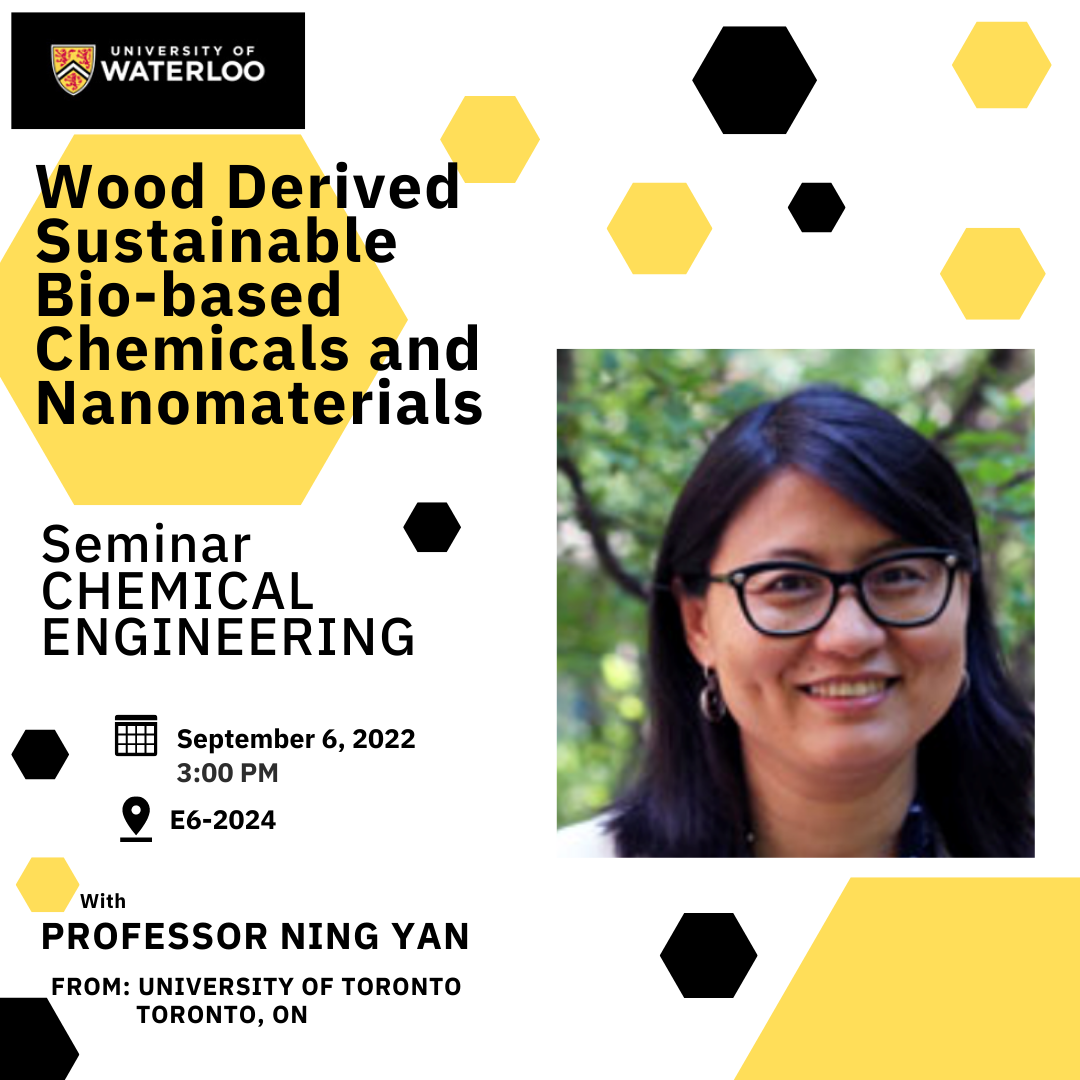
You're invited to join the Department of Chemical Engineering for a seminar by Professor Ning Yan. Professor Yan holds a University of Toronto Distinguished Professorship in Forest Biomaterials Engineering at the Department of Chemical Engineering and Applied Chemistry with a cross appointment to John H. Daniels Faculty of Architecture, Landscape, and Design. She was also an Endowed Chair in Value Added Wood and Composites in the Faculty of Forestry previously. Professor Yan is also a Tier 1 Canada Research Chair in Sustainable Bioproducts.
Abstract
Wood Derived Sustainable Bio-based Chemicals and Nanomaterials
By: Professor Ning Yan,
Tier 1 Canada Research Chair in Sustainable Bioproducts
University of Toronto
To reduce our reliance on fossil fuel resources, we have developed a portfolio of bio-based chemicals and materials using natural wood polymers as the building block. Using wood derived polyphenols, such as abietic acid, we have synthesized a new family of fully bio-based shape memory polyurethanes together with bio-based chain extenders. The bio-based polyurethanes exhibited excellent thermal-induced shape memory responses. These bio-based shape memory materials also possessed good biodegradability, providing more sustainable alternatives to current fossil fuel derived products. In addition, we have used lignin to make novel photothermal bio-based adsorbents capable of rapid clean-up of crude oil spills with outstanding adsorption capacities for heavy crude oil. With the effective structural design, excellent environmental friendliness, rapid oil adsorption rate, and high oil adsorption capacity, these lignin-based absorbents present a promising solution for addressing catastrophic large-area viscous crude oil spills. Moreover, we have developed novel lignin containing nanocellulose fibrils (LCNFs) that contain a significant amount of lignin. The presence of natural lignin on the surfaces of the nanocellulose fibrils exhibited strong synergistic effects to possess some unique functionalities. We have demonstrated excellent potentials of applying LCNFs for reinforcing engineering plastics and making fully biodegradable plastic biocomposites with highly improved mechanical properties as well as enhancing functional performances in flexible energy storage devices, sensors, and tribonanogenerators (TENGs).
Biographical Sketch
Professor Ning Yan is a Tier 1 Canada Research Chair in Sustainable Bioproducts. She also holds a University of Toronto Distinguished Professorship in Forest Biomaterials Engineering at the Department of Chemical Engineering and Applied Chemistry with a cross appointment to John H. Daniels Faculty of Architecture, Landscape, and Design. She was also an Endowed Chair in Value Added Wood and Composites in the Faculty of Forestry previously. Professor Yan has disseminated more than 300 publications, including more than195 peer-reviewed papers in leading scientific journals. She is an international expert on forest biomaterial science and bio-based polymers and resins. She has won numerous prestigious awards for her teaching and research excellence, including the Bill Burgess Teaching Award, Early Researcher Award, and NSERC Discovery Accelerator Supplements Award. She is a fellow of the Engineering Institute of Canada and International Academy of Wood Sciences. Dr. Yan is the Director of the Low Carbon Renewable Materials Centre at the University of Toronto.